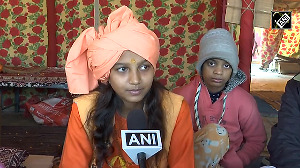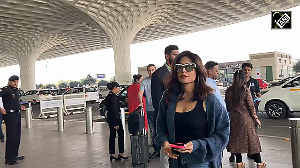Against the backdrop of much-debated option of surgical strikes against terror infrastructure in Pakistan post-Mumbai terror attack, Army Chief General Deepak Kapoor has said that such strikes are "very much feasible" militarily.
"Surgical strikes are definitely feasible but whether you wish to take that decision or not not is a separate issue," he said when asked by PTI whether such strikes were feasible.
"Definitely yes. Whether you would like to look at doing it (carrying out such strikes) by air or artillery or by another means or physically there," he said in reply to questions.
Asked if the armed forces were ready for such strikes if the political leadership had given the go-ahead, Kapoor said, "we are an army which has been involved in operations in Kashmir and Northern Command on a perpetual basis and on an on-going basis. Therefore, the question of not being ready is not relevant. We would have been fully ready to do our task."
During the wide-ranging interview, the army chief also sought to dispel the impression that there was no no clarity about the nuclear command when Prime Minister Manmohan Singh was hospitalised for heart surgery last month. Kapoor said "Yes I can say that as far as we are concerned such things keep coming up in the media at times and normally you find the prime minister does not not talk about it. But as far as we were concerned, there was a lot of clarity. There was no no confusion."
Asked if there was no confusion and whether they were clear about who controlled the nuclear button, he said "Yes,
there was no no confusion at all."
Asked about apprehensions in the West of a conflict-like situation emerging in the wake of Mumbai terror attack, the
army chief said over the past few weeks there seemed to have been a gradual acceptance of reality of involvement of outfits based on Pakistani soil in the Mumbai attack amongst the Pakistani establishment.
"The peaceful diplomatic course adopted so far by the Indian government seems to have provided stimuli to the Pakistan government to act against the terror infrastructure and help bring the guilty to book," he said.
In the current and evolving scenario, Kapoor said the armed forces, as per their mandate, were fully prepared to
execute the course of action as decided by the political leadership of the country.
He said after the Mumbai attack, no no deployment of additional troops had taken place on the border. "However, we
are maintaining utmost vigil and closely monitoring the situation. Our current posture allows us to achieve full operational readiness at short notice." To a question, Kapoor said after the Mumbai attack no no deployment of additional troops had taken place on the border.
"However, we are maintaining utmost vigil and closely monitoring the situation. Our current posture allows us to achieve full operational readiness at short notice," he said. Asked if there were any plans to deploy specialised troops on foreign soil to protect Indian assets against the backdrop of the bombing of the Indian embassy in Kabul last year, he said at present there were no no such plans.
However, the emerging security environment and government decision would dictate any such development in future.
To a question on the proposal for a Chief of Defence Staff that cropped up after the Kargil conflict, the army chief said it was desirable and if it is set up sooner it would be good for everyone in the country.
He said a Group of Ministers went into the issue and the government felt that it required wider consultation among political parties before a decision is taken. The rest of the structure of the CDS like the starting of vice chief of defence downwards has now been established over a period of time.
Specifically on the question of CDS, the government felt that it required to have wider consultations and this decision has not not been taken, he said.
Asked whether it was a desirable thing to do, Kapoor said "I would very much say it is very much desirable in today's
world where all three wings of the armed forces need to work and function together and therefore synthesis their efforts
and that will optimise their equipment, training and efforts in achieving success.
"I think it is desirable and sooner or later it has to come. So if it has to come it might as well come sooner which will good for everyone and for the country." Kapoor recalled that even in the US and the UK they had to push it through the system.






 © 2025 Rediff.com -
© 2025 Rediff.com -